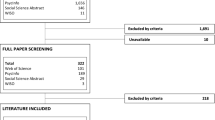Abstract
This study assessed the influence of service systems integration on employment outcomes for persons with mental illness. A survey was sent to all 125 key program staff that worked for community mental health treatment agencies or vocational rehabilitation agencies. The survey found that referral and employment rates were low; but that these rates were related to characteristics of the interagency systems integration. Community mental health staff referred 448 individuals for employment services. Staff from vocational rehabilitation agencies accepted only 26% of these referrals and found work for just 11%; 7% were employed six months later. Also, 39% of respondents reported that the linkage agreement between their agencies was never established. This study suggests the need for more effective strategies for integrating mental health treatment and vocational rehabilitation systems.

Similar content being viewed by others
References
Attkisson, C., Cook, J., Karno, M., Lehman, A., McGlashan, T.H., Meltzer, H.Y., O’Connor, M., Richardson, D., Rosenblatt, A., Wells, K., Williams, J., & Hohmann A.A. (1992). Clinical services research. Schizophrenia Bulletin, 18, 561–626.
Becker, D.R., Torrey, W.C., Toscano, R., Wyzik, P.F., & Fox, T.S. (1998). Building recovery-oriented services: Lessons from implementing Individual Placement and Support (IPS) in community mental health centers. Psychiatric Rehabilitation Journal, 22(1), 51–54.
Black, B.J.(1988). Work and Mental Illness: Transitions to Employment. Baltimore: Johns Hopkins Press.
Bond, G.R., Becker, D.R., Drake, R.E., Rapp, C.A., Meisler, N., Lehman, A.F., Bell, M.D., & Blyler, C.R. (2001). Implementing supported employment as an evidence-based practice. Psychiatric Services, 52(3), 313–322.
Bond, G.R., Drake, R.E., Mueser, K.T., & Becker, D.R. (1997). An update on supported employment for people with severe mental illness. Psychiatric Services, 48(3), 335–346.
Bond, G.R., & Mcdonel. (1991). Vocational rehabilitation outcomes for persons with psychiatric disabilities: An update. Journal of Vocational Rehabilitation, 1, 9–20.
Cook, J.A., Lehman, A.E., Drake, R., et al. (2005). Integration of psychiatric and vocational services: A multisite randomized, controlled trial of supported employment. American Journal of Psychiatry, 162(10), 1946–1948.
Cook, J.A., Pickett-Schenk, S.A., Grey, D., Banghart, M., Rosenheck, R.A., & Randolph, F. (2001.) Vocational outcomes among formerly homeless persons with severe mental illness in the ACCESS program. Psychiatric Services, 52, 1075 – 1080.
Dellario, D.J. (1985). The relationship between mental health, vocational rehabilitation interagency functioning, and outcome of psychiatrically disabled patients. Rehabilitation Counseling Bulletin, 28, 167–170.
Federal Register (1992, June 24). Vocational Rehabilitation Act Amendments of 1992 (29 United States Code 706 (18)). Washington, D.C.: U.S. Government Printing Office.
Hursh, N.C., Rogers, E.S., & Anthony, W.A. (1988). Vocational evaluation with people who are psychiatrically disabled: Results of a national survey. Vocational Evaluation and Work Adjustment Bulletin, 21, 149–155.
Kasper, J.A., Steinwachs, D.M., & Skinner, E.A. (1992). Family perspectives in the service needs of people with serious and persistent mental illness: Part II: Needs for assistance and needs that go unmet. Innovations and Research, 1, 21–33.
Katz, L.J., & Geckle, M. (1990). A survey of perceptions and practice: Interagency collaboration and rehabilitation of persons with long-term mental illness. Rehabilitation Counseling June Bulletin, 33(4), 290–301.
Lehman, A. (1983). The well-being of chronic mental patients. Archives of General Psychiatry, 40, 373–396
Lehman, A.F., & Steinwachs, D.M. (1998). Patterns of usual care for schizophrenia: Initial results from the Schizophrenia Patient Outcomes Research Team (PORT) Client Survey. Schizophrenia Bulletin, 24(1), 11–20.
Mathews, J.W. (1979). Effects of Work Activity Program on Self-concept of Chronic Schizophrenics. Dissertation Abstracts International, 41, 358B (University Microfilms N. 816281–816298).
Mechanic, D. (2003). Policy challenges in improving mental health services: Some lessons from the past. Psychiatric Services, 54, 1227–1232.
New Freedom Commission on Mental Health (2003). Achieving the Promise: Transforming Mental Health in America. (Final Report). DHHS Pub. No. SMA-03-3832. Rockville, Maryland.
O’Brien, A., Price, C., Burns, T., & Perkins, R. (2003) Improving the vocational status of patients with long-term mental illness: A randomized controlled trial of staff training. Community Mental Health Journal, 39(4), 333–347.
Randolph, F., Goldman, H.H., Blasinsky, M., et al. (2002.) Overview of the ACCESS program. Psychiatric Services, 53(8), 967–969.
Rogers, E.S., Walsh, D., Masotta, L., & Danely, K. (1991). Massachusetts Survey of Client Preferences for Community Support Services (Final Report). Boston: Center for Psychiatric Rehabilitation.
Rosenheck, R.A., Lam, J., Morrissey, J.P., Calloway, M.S., Stolar, M., & Randolph, R. (2002.) Service systems integration and outcomes for mentally ill homeless persons in the ACCESS program. Psychiatric Services, 53(8), 958–966.
United States Public Health Service. Office of the Surgeon General (1999). Mental Health: A Report of the Surgeon General. DHHS. U.S. Public Health Service. Rockville Maryland.
Acknowledgments
The National Institute of Mental Health provided funding for this study to Dr. Patrick Corrigan (PI), and to Drs.Patricia Hanrahan and Daniel J. Luchins (Co-Investigators). We also wish to acknowledge Drs. Patrick Corrigan, Gary Bond and Kenneth Rasinski for their thoughtful review and comments on the survey questionnaire.
Author information
Authors and Affiliations
Corresponding author
Additional information
A version of this paper was presented at the Academy/Health annual conference in San Diego, June 8, 2004.
Rights and permissions
About this article
Cite this article
Hanrahan, P., Heiser, W., Cooper, A.E. et al. Limitations of System Integration in Providing Employment Services for Persons with Mental Illness. Adm Policy Ment Health 33, 244–252 (2006). https://doi.org/10.1007/s10488-005-0026-y
Received:
Accepted:
Published:
Issue Date:
DOI: https://doi.org/10.1007/s10488-005-0026-y




